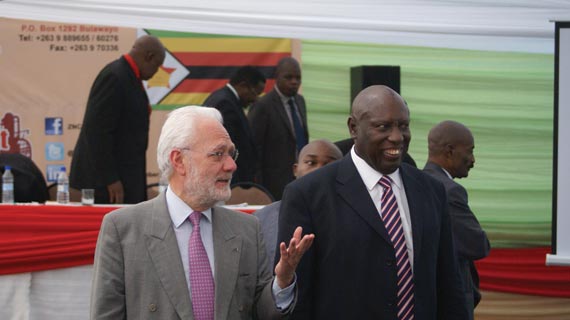
HARARE – The European Union (EU) Ambassador to Zimbabwe Aldo Dell’Ariccia on Tuesday said the government’s economic blue print, ZimAsset, needs more work and disputed suggestions that there was a leadership crisis in the country, as the rhetoric between the bloc and the southern African country continues to be toned down.
ZimAsset – an acronym for Zimbabwe Agenda for Sustainable Socio-economic Transformation – is a five-year economic plan that will guide President Robert Mugabe’s Zanu PF government through to 2018. The plan, which the government says requires up to $30 billion in funding, has been criticised widely for lacking clear provisions on how the funds would be raised.
Analysts have also warned that internal Zanu PF battles over who succeeds Mugabe,90, have undermined the government’s ability to oversee Zimbabwe’s stalling economic recovery.
In remarks made in response to presentations at a Crisis in Zimbabwe Coalition workshop on the economy, which he prefaced by saying he was speaking not as an ambassador but as a “political analyst,” Dell’Ariccia said the country does not have a leadership crisis and the government’s much-maligned economic blueprint was not yet a finished product.
“Luckily we don’t have a leadership crisis in this country because of the…forces you have within the party in government, if we had a leadership crisis it will be chaos. We still have a leadership, we still have a leader who manages to keep at bay and under control these forces that are very much contradictory,” Dell’Ariccia said.
He added that ZimAsset, which came under sharp criticism from other speakers, was not necessarily a bad blueprint, but needs more work.
“I have the impression that you are bashing ZimAsset or ridiculing ZimAsset as (if) it was a development policy or a poverty reduction strategy. ZimAsset is just a blueprint, it’s work in progress and I think that the government and in particular the minister of finance knows very well that the work is not completed,” Dell’Ariccia said.
“And they are calling on the African Development Bank, in particular, in order to provide technical assistance that would permit (it) to go from the blueprint to a development strategic document which means the technical consideration, the resources which are necessary, taking into consideration the risks which are there and how to handle these risks and the chronology.”
- Chamisa under fire over US$120K donation
- Mavhunga puts DeMbare into Chibuku quarterfinals
- Pension funds bet on Cabora Bassa oilfields
- Councils defy govt fire tender directive
Keep Reading
He said non-governmental organisations, which have had troubled relations with the government in the past, need to leave their antagonistic positions against the government and its programmes.
“I think that the civil society has a role to play but I have the impression that you are a little bit anchored to the past…if you start catching the flare of the time, the trend, there is an opening. Play a constructive role,” Dell’Arricia said.
Zimbabwe’s relations with western governments broke down in 2000 over allegations of human rights violations and electoral theft against President Robert Mugabe and his Zanu PF party, charges which he denies, but ties have thawed in recent times.
The EU has lifted sanctions, mostly travel bans and financial restrictions, on all senior Mugabe allies, but still maintain them against the veteran leader and his wife, along with a state-owned arms firm.
In recent weeks, European states – Denmark and Switzerland have indicated intentions to restore normal ties, while the European Investment Bank last week said it would resume lending to the private sector, although arrears of about $300 million preclude lending to the government.
The EU has also said it might resume direct development aid to Zimbabwe later this year. – The Source










